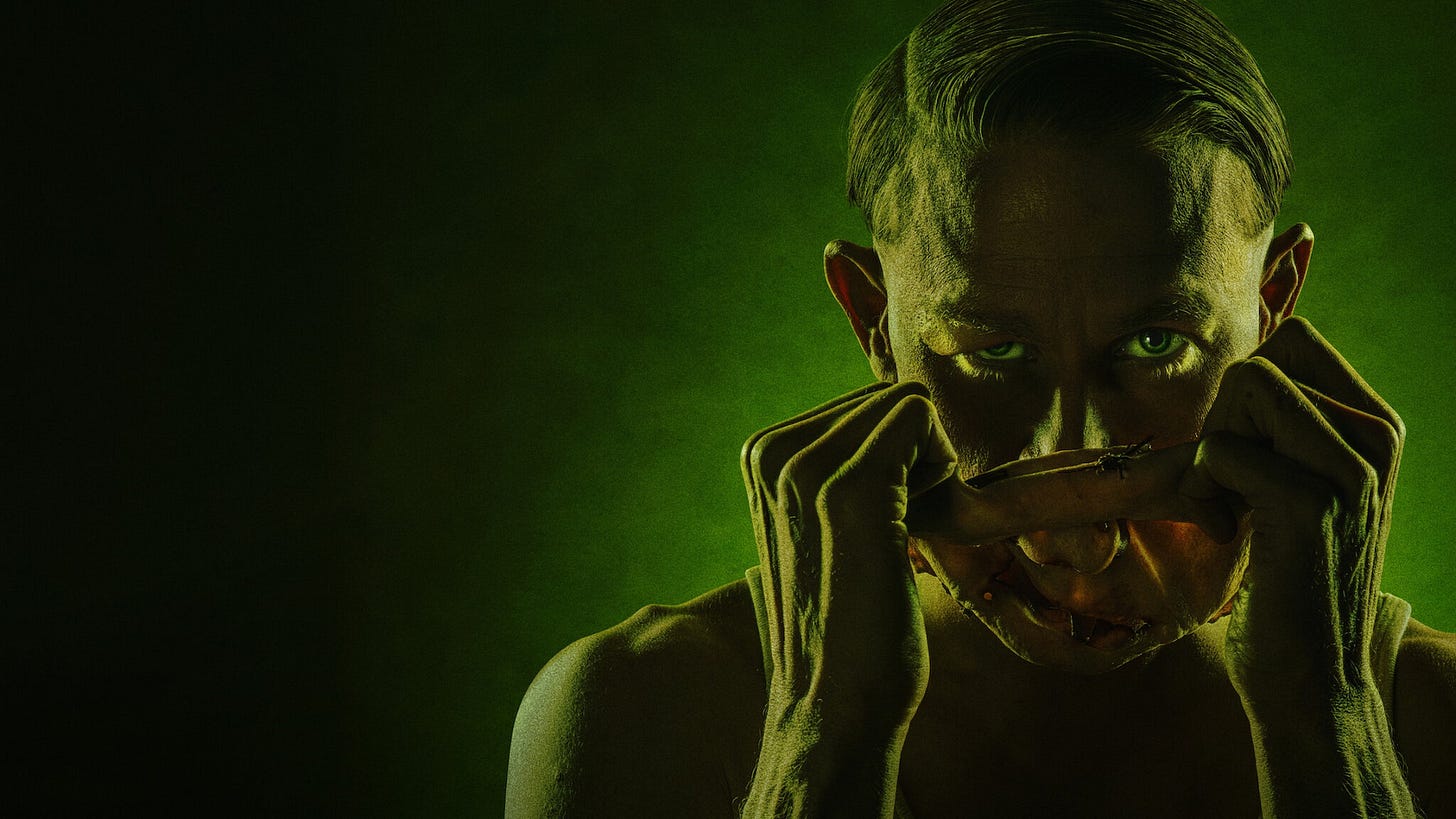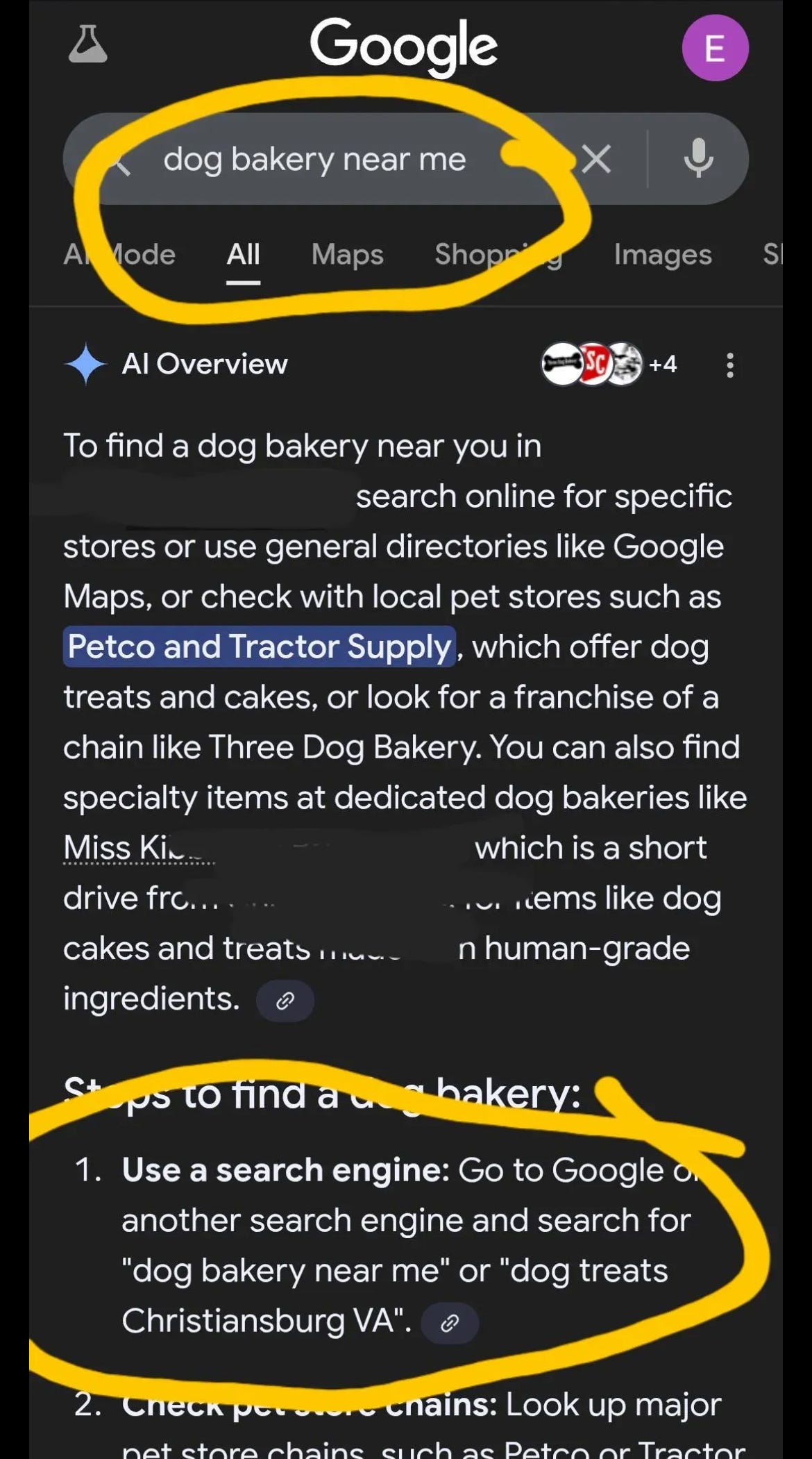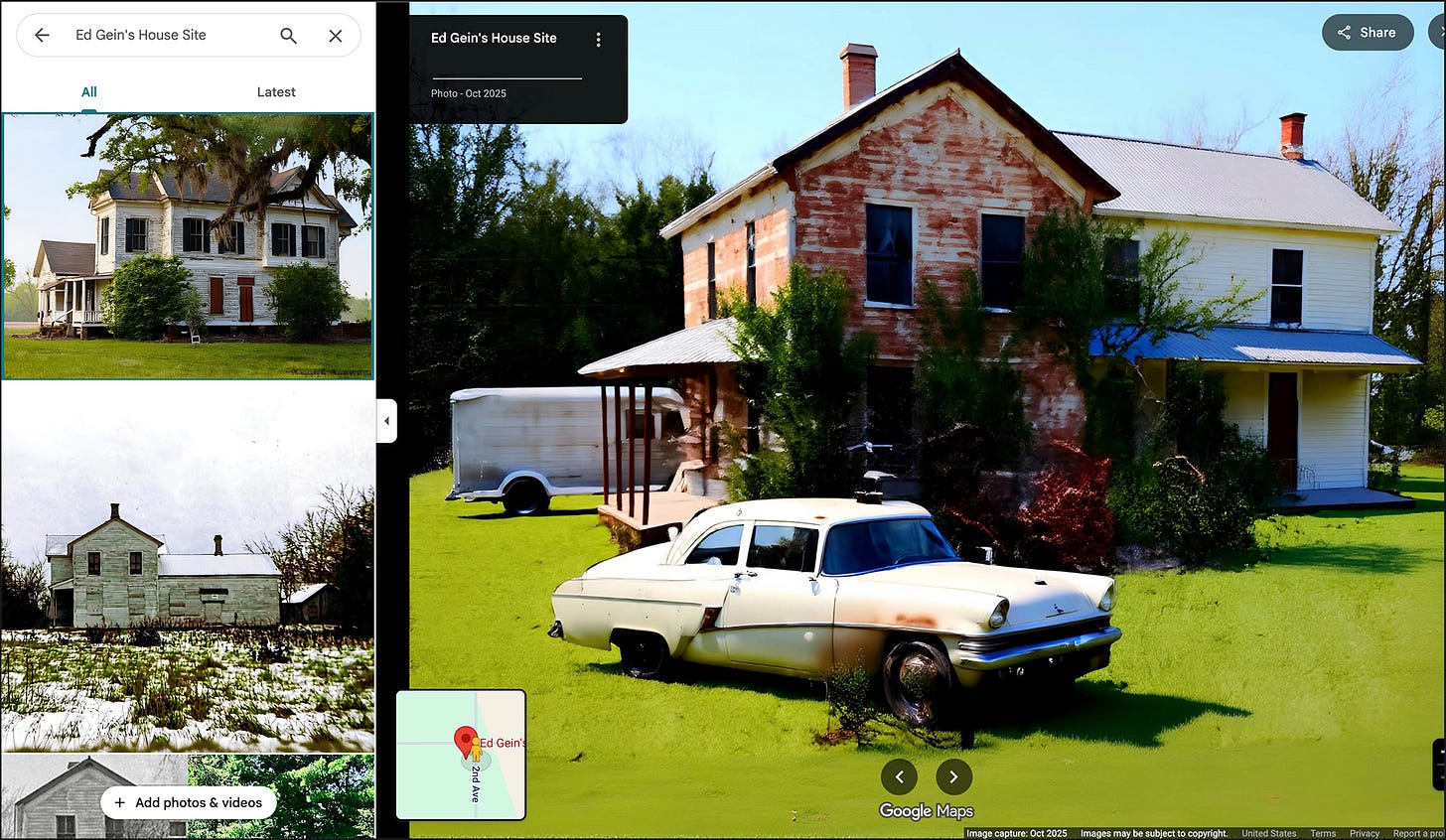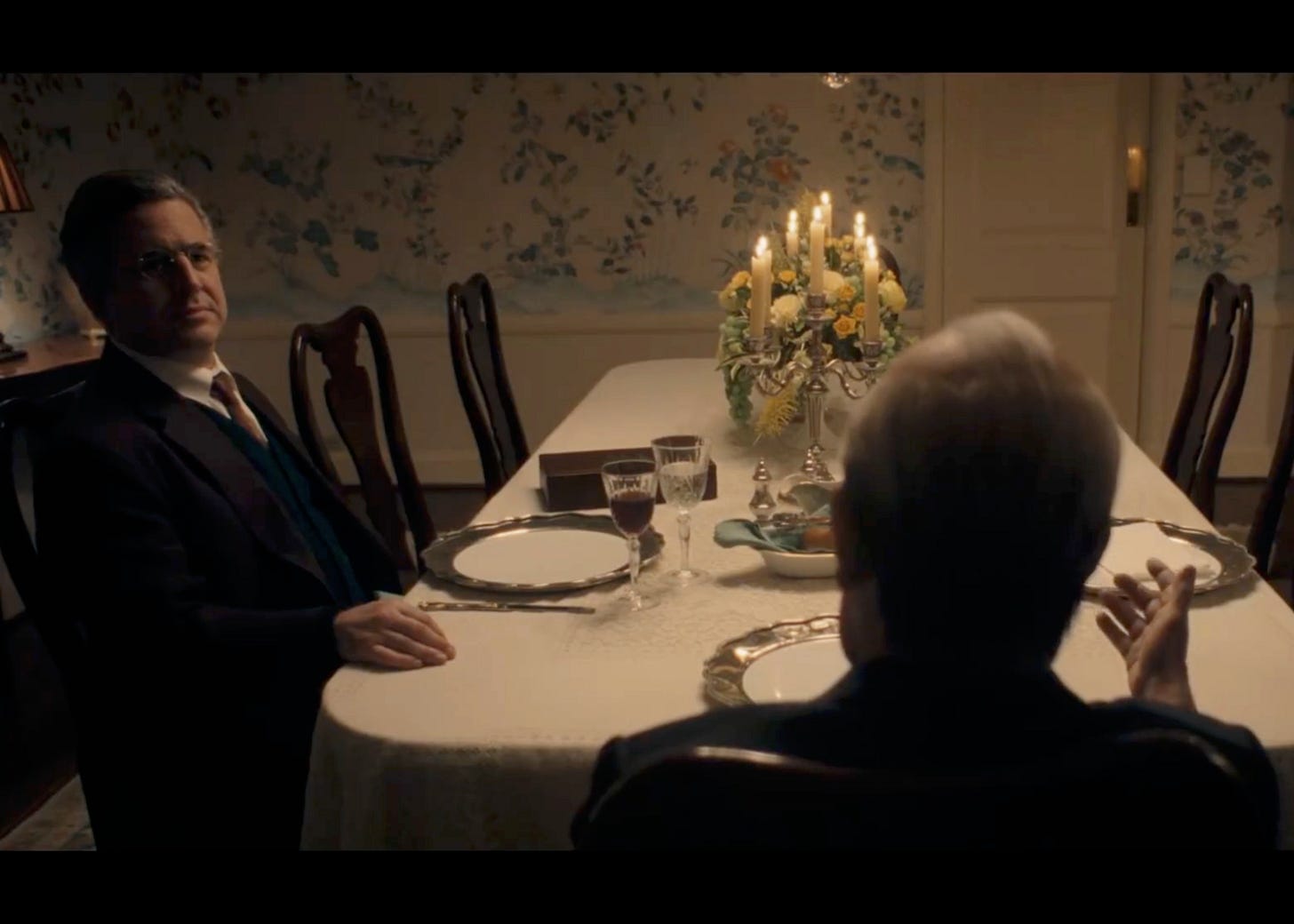Less Good, More Bad
It’s not photography that’s in danger, it’s truth.
Just a little PSA in case you missed it. Last week I shared a link to buy the printed-on-paper version of Art + Math. You bought them, which I appreciate! We still have more for sale and I’d love for more of you to acquire them. If you’re looking for the perfect gift for that special someone in your life (me), hit up the A+M store for the lowdown on this quaint little collection of essays. Now, on with the show.
Throughout October, if the television in my house is on, it’s on scary stuff. Last night it was the newest installment of the Netflix series “Monster,” which is about the real life serial killer who inspired the movie “Psycho.” Ed Gein was his name, and he was not very nice at all.
As I often do when watching fictional stories about real people, I opened my laptop and navigated to Google Maps to get a better look at the place where it all happened. Having oriented myself to the town of Plainfield, Wisconsin, I typed into the search bar “Ed Gein…” and watched it autofill “...house site.” I’m not the only weirdo who does this, clearly.
Google took me to an aerial view of the intersection of 2nd and Archer, where the Gein family homestead sat well outside of town. An ideal place to get away with terrible things.
Google Maps might be my favorite website. It’s one of my most visited, certainly, and the one that’s most practically helpful on a day to day basis. It’s the perfect intersection between my online and offline lives. I use it to scout possible production locations or determine which facade of a structure faces the sunrise. And of course I use it to find places to eat, sleep and gas up the car. Mostly, though, I use Google Maps to find the fastest route to some place I’m supposed to be. It’s one of the most practically useful websites around.
Unless, of course, Google continues to “improve” it by replacing a lot of actual human intelligence with the artificial kind.
Earlier this week I stumbled upon a great discussion about all the ways Google’s search function was becoming less capable at the hands of AI. Mainly it was people complaining about how good it used to be and how bad it is now.1
My favorite item in the discussion was a screenshot of someone’s search for a “dog bakery near me.” Google’s AI Overview helpfully suggested that, to find a dog bakery nearby, simply search online for stores or general directories: “Step 1: Use a search engine.” Oh the delicious irony. Not since “add glue to your pizza sauce” has an AI foible brought me so much schadenfreude.
I’m not an AI hater, I swear. But I am increasingly skeptical. It’s because my hit rate with the technology is simply not very good. Yes, it absolutely can do some very impressive things. But ruining things that already worked really well — search results, art, poetry — is not engendering confidence.
Watching a behemoth like Google, with its $3 trillion market cap, work so hard to shoehorn half-baked technology into what was previously a pretty amazing offering, shows they are willing to compromise the effectiveness of their core business just to, what, to be AI?
I’m no genius tech bro, but it seems like serving subpar results could have the opposite of its intended effect. Instead of impressing us with AI’s effectiveness, it’s pretty frequently stupefying us with its awkwardness. I keep being told how game-changing LLMs are — or how they’re going to be any minute now — and so I keep testing them out. Nine times out of ten I end up with terrible results. Fast, but terrible.2
I’m pretty comfortable saying that if your thing is formulaic, AI is going to take over. Trouble is, the most interesting stuff isn’t very formulaic. And lots of things in the creative world that may seem formulaic are not. Their human imperfectness is often what makes them interesting.
LLMs are often more concerned with appearing helpful than actually being helpful. There are myriad examples of LLMs deceiving us, camouflaging inadequacies in the most insidious ways all because they’ve been programmed to be sycophants first. Their makers believe it would be worse to say “I can’t do that” than to say “here is the data you’ve asked for” even though it is not actually the data you’ve asked for. It just looks kind of like it if you squint.
It’s not better, it’s just faster. At least that’s how it seems to me, so far, for so much.
I will happily use a tool that helps do my work better. Or faster and of the same quality. Maybe even faster and of similar quality for certain things. But when I try it I’m often left mildly frustrated and annoyed and wishing I’d just buckled down and gotten to work.
This old fashioned idea is something I’ve doubled-down on in recent years, as I’ve mentioned here and there. I’m absolutely convinced as more things become more automated and ineffective, those of us embracing humanity’s brilliant imperfectness will witness a backlash against unhelpful automated tech and a return to appreciation for handmade excellence.3
How does all of this relate to Ed Gein? Well, as I sat studying the outskirts the remnants of the Gein homestead at the corner of 2nd and Archer, I clicked the option to “See Photos,” that helpful link atop every Google Maps listing that shows street views and pictures of the location, be it a photo of the building or a street view of the location or snapshots of the tacos they sell.
What I found was more awful than I could have imagined.
No, it wasn’t crime scene photos, it was even worse. It was AI.
Much like restaurant guests submit photographs of tacos, visitors to the Google Maps Ed Gein homestead listing had submitted AI-generated images of the absolute worst quality you can imagine. Instead of seeing photographs — useful, informative photographs — of the real place in the real world, I was presented with colorful little fantasies about what the place might have looked like in the imagination of a guy who had the time to make and upload them.
This was aggressively unhelpful. Less than not useful, it was active disinformation. Instead of seeing photographs of the place, some people will surely think they’re seeing photographs of the place when they’re in fact seeing lies hallucinations AI renderings.
And that’s when it struck me: our society is mere moments away from fully not being able to discern what’s real from what isn’t.
We’re gonna show up to get good tacos but they’re gonna be terrible tacos, nothing like the picture. And not just Tacos, but also every other photograph ever. Historical ones too. Talk about alternative facts. Now they come with pictures.
In the second episode of the Ed Gein show, a conversation between a fictionalized Alfred Hitchcock and the fictionalized writer of Psycho, Robert Bloch, pertained to this very subject. Bloch explained the real life impact on Gein of seeing WWII photographs of Nazi atrocities. He spoke of the power of photographs at the very moment I was on my couch considering fake photographs filling Google with misinformation.
“Such is the power of the photographed image,” Hitchcock said.
“That’s right,” Bloch responded. “You cannot hide from what a photograph shows you. You cannot pretend a photograph is anything other than what it is. A photograph is truth.”
Don’t come at me. We all know the myriad ways photographs lie. But ignoring the fundamental truth at the core of the photographic process is naive. Borderline dishonest, frankly. There is an evidentiary nature inherent to this medium, a special capacity for truth inaccessible to all others. Photographs are special. And I’m gravely concerned that we’re going to ruin that specialness if we’re not careful. We’re going to commingle photorealistic AI-generated imagery with the photographic image and instead of bringing photography’s veracity to AI pictures, the reverse will happen: AI’s inherent fraudulence is going to rub off on photography. We’re going to water down the truth such that nobody believes anything any more.
I am convinced that unless the pushback gains critical mass, we’re doomed to find ourselves on the receiving end of more of the same. Less quality, more speed. Less help, more hassle. Less truth for us, more profit for them. Less good, more bad, in every way imaginable.
But hey, adapt or die, everything just evolves, it’s only going to get better and all that, amiright?
And I do concede: That tenth time is, genuinely, amazing.
“Handmade” in this case meaning simply done with intent by a human, and “excellence” meaning a new, unbelievably low bar like “answering the phone” or “adequately doing the thing you were paid to do and not lying about it.”







AI slop creep. this is a way for it to creep in that i don’t see coming 😵💫
As a fellow map nerd I'd like to suggest you have a look at Organic Maps.
It's not as good as Google Maps for listings and has no street view but if you want to navigate to a spot it's a big step forward, so much cleaner and easier to read.